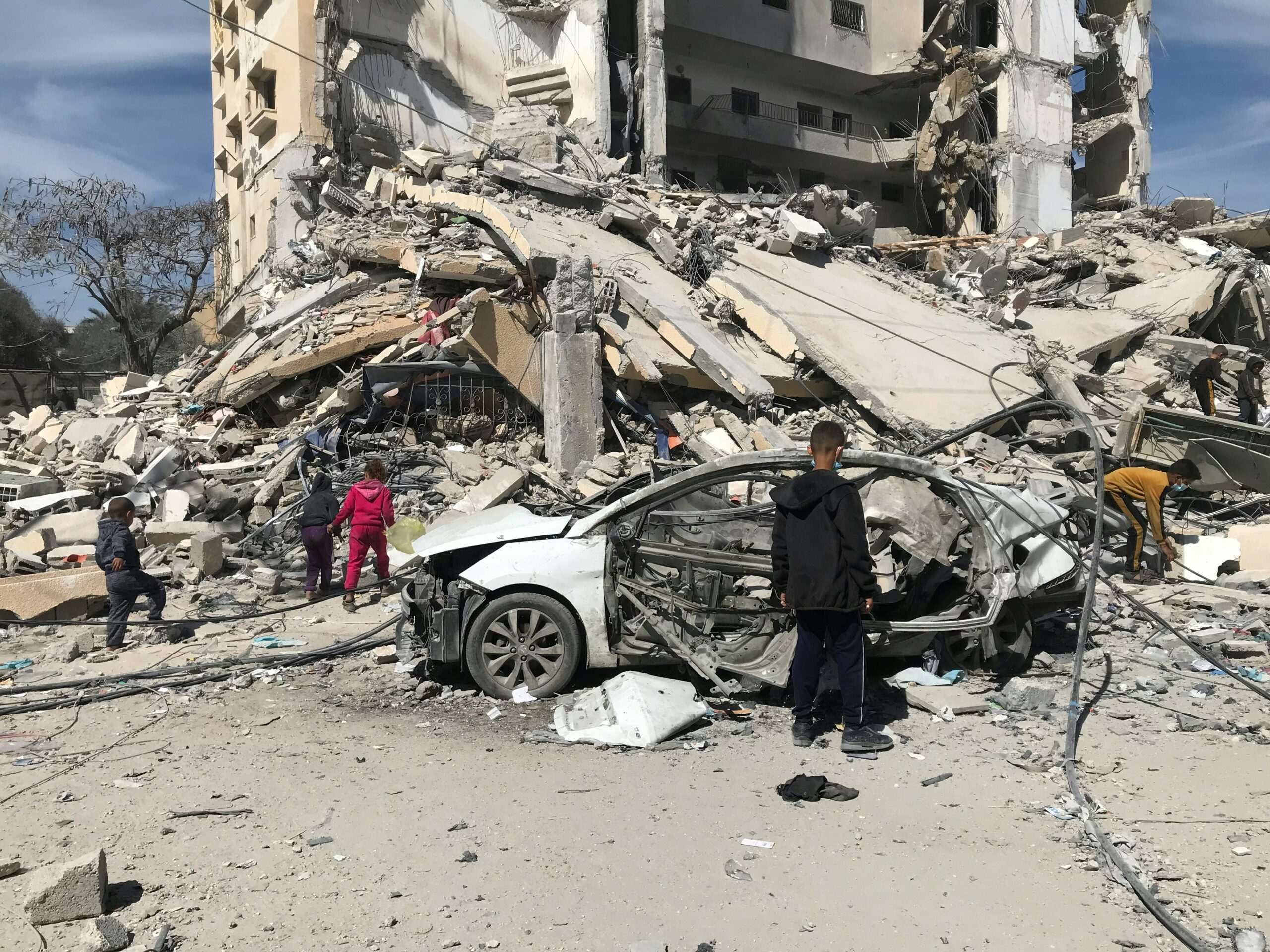HRSJ 5010
Foundations of Human Rights and Social Justice
We delved into themes of human rights and social justice, addressing issues of justice, fairness, and decolonization across local, national, and transnational contexts. We explored theoretical frameworks such as universalism/relativism, equity, diversity and inclusion, intersectionality, distributive justice, critical race theory, disability theory, feminist analysis, and the influence of social and political structures. The foundational course emphasized Indigenous, anticolonial, decolonizing, antiracist, and Global South perspectives. Key areas included the practical application of these theories in both international and domestic settings, covering topics like human rights laws, social movements and activism, decolonization and reconciliation, torture and legal process deficiencies, refugee and immigrant rights, access to justice, disability rights, governance, transnational governance, Indigenous rights, and international human rights.
HRSJ 5020
Indigenous Ways of Knowing: Resurgence of Land Based Pedagogies and Practices
It was an eye opener coming from Africa and coming to Canada I learnt a lot in this course, we examined Indigenous land-based knowledge systems through an interdisciplinary lens, incorporating Indigenous law, geography, social work, education, health, and wellness. By engaging with Indigenous intergenerational land-based contexts, practices, and processes, we as students articulated ethical ways of living that honor Indigenous self-determination and sovereignties. Our experiential approach centered Indigenous knowledge, treating the land as the primary source of learning. We also investigated how colonial policies and practices obstruct Indigenous access to land and how various resistance and resurgence movements are advocating for Indigenous rights related to food, water, education, ceremonies, and mobility.
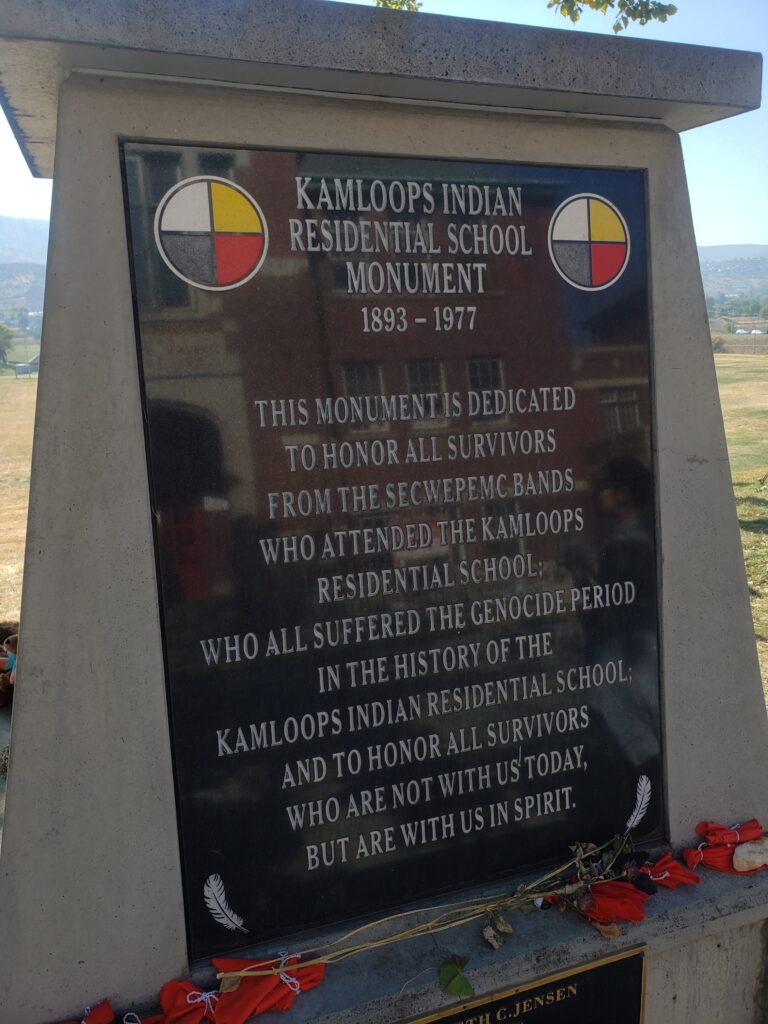
I was instantly overpowered by the magnitude of history that seemed to loom over the grounds of the Kamloops Indian Residential School. One of Canada’s biggest residential schools, it was in operation from 1890 until 1978. Its legacy serves as a sobering reminder of the systematic attempts to integrate Indigenous students. I kept thinking about the thousands of kids who had traveled these identical routes, frequently ripped from their families and towns, as I got closer to the main structure. The structure itself, now worn by the years, served as a mute reminder of the innumerable tales of adversity and tenacity.
The echoes of the past hung thick in the air inside. Stories of children who were compelled to give up their languages, cultures, and identities were shown on the walls, which were embellished with images and artifacts. I was particularly drawn to one picture of a group of young children wearing uniforms, their faces displaying a mixture of doubt and terror. It served as a sobering reminder of the suffering these defenseless lives had endured.
I had the chance to hear the survivor’s experiences throughout the visit. They described the cultural, emotional, and physical abuse they suffered in heartbreaking detail. One elder talked about how difficult it was to regain his identity after leaving school and how painful it was to be apart from his family.
“Genocide begins, however improbably, in the conviction that classes of biological distinction indisputably sanction social and political discrimination.” – Andrea Dworkin
The grounds were peaceful outside, but the visit was made harder by the recent discovery of unmarked graves. As a heartbreaking reminder of the lives lost and the families split apart, these graves emphasized how critical it is to recognize and deal with this sad period in Canadian history.
I took a strong sense of duty with me when I departed from the Kamloops Indian Residential School. The trip was a call to action for the future as much as a trip into the past. It reaffirmed the need to make amends, respecting survivors’ experiences, and making sure that injustices of this kind never happen again. The experience of visiting Kamloops Indian Residential School was intense and moving, and it permanently altered my perspective of Canada’s past and the continuous pursuit of justice and reconciliation.
HRSJ 5030
Problem Solving in the Field: Study Techniques and Methods
We studied social science and humanities field research as multidisciplinary practices conducted in diverse contexts and locations. We engaged with both quantitative and qualitative epistemologies and methodologies. We learned to formulate basic research questions and explored various methodological research choices and their ethical implications. We also engaged with Indigenous and anti-colonial research methods, including data collection and analysis used in the Global South. As students, we learned to create comprehensive research proposals and ethics applications. One of the major highlights for me in this course was learning how to do a grant application, which I think would be a great deal for my career projection. For someone like myself who is looking forward to getting a career in the Humanitarian field, it was a revelation.
HRSJ 5110
Genocide in the 20th Century
We approached the complex issues of genocide from an interdisciplinary perspective, incorporating philosophical, historical, and literary viewpoints. The course covered various elements, including specific case studies of genocide, the use of language, the roles of eugenics and colonialism, ethical and moral considerations, and international efforts to define and address different types of genocide. By utilizing diverse sources and methodologies, we learned how to make an original contribution to the increasingly important field of genocide studies. In the course, I had an opportunity to do research on Genocide cases that happened some time. One such case was Gukurahundi, which happened in Zimbabwe in the 1980s.
What were the long-term consequences of sexual violence against women, both individually and within the affected communities, during the Gukurahundi?
The goal of this study was to thoroughly investigate the historical facts, effects, and possible methods of therapy associated with the Gukurahundi genocide. The purpose of this study was to investigate the long-term impacts of sexual assault against women on both the victims and the affected communities. This study examines the impact of the Gukurahundi incident between the Ndebele and Shona ethnic groups on all parties involved, with a particular focus on women in the Matabeleland region. The long-term impacts of sexual violence require a comprehensive approach that includes campaigns for education and awareness, legal and justice reforms, efforts to counter cultural attitudes and norms that condone violence against women, and support services for survivors.
In order for survivors to seek justice, receive healthcare, receive counseling, and rebuild their lives with dignity and support, safe spaces must be created. According to the historic Akayesu Judgment of the International Criminal Tribunal for Rwanda, rape and other forms of sexual assault can be considered actus reus of genocide under Article II of the United Nations Convention against Genocide. Therefore, the Akayesu Judgment provides a logical framework for analyzing a covert case of extreme post-colonial state violence in Zimbabwe, which declared its intention to commit mass atrocities against the ethnic minority Ndebele during Operation Gukurahundi in Matabeleland and parts of the Midlands.
“The 20th century taught us how far unbridled evil can and will go when the world fails to confront it. It is time that we heed the lessons of the 20th century and stand up to these murderers. It is time that we end genocide in the 21st century.” – Allyson Schwartz
The study focuses on the trends of mass rape and sexual assault during the military campaign in Matabeleland in 1983 and 1984. This study provides a critical new perspective on Operation Gukurahundi by identifying systematic, persistent patterns of sexual assault, including rape, across Matabeleland. In-depth interviews and victim testimony from all throughout the region are used to achieve this. Patterns of rape and other sexual violence found in the study suggest that during 1983 and 1984, the state engaged in a systematic policy of genocidal rape.
HRSJ 5210
Law, Human Rights and Theories of Justice
As students, we explored the history, nature, and scope of various rights, including legal, civil, political, and human rights, both for individuals and groups. We traced the development of rights theory from early social contract theorists like Hobbes, Locke, and Rousseau to contemporary theories of rights and justice. We also examined the relationship between rights, conceptions of justice, power dynamics, and the law. Additionally, we looked at how different conceptions of rights can either promote or hinder the social advancement of specific groups and how rights have been applied to equity-seeking groups in both theory and practice.
HRSJ 5230
States, Violence, Revolutions and the Emergence of Global Capitalism
As students, we examined the history and development of modern political structures, such as the nation-state and the capitalist global order, through social and political revolutions, wars and pacification, liberal constitutionalism, and democratization. We also discussed cosmopolitanism and its connection to contemporary global interconnection. We analyzed patterns of conflict and cooperation between state actors and social groups at regional, national, and transnational levels. Additionally, we explored key contemporary issues from various social science perspectives, drawing on core theories related to cosmopolitanism, materialism, and post-structuralism, and considered how states can coexist peacefully in an anarchic world system. I will reflect on an assignment I did for this course, which I gave a title.
What is the impact of multinational corporations and investment practices, and how do they contribute to internal displacement in South Kivu, DRC?
In this assignment, I investigated how local populations in the Democratic Republic of the Congo (DRC) are severely impacted by multinational mining companies, resulting in trauma and internal displacement. I looked at how these companies’ put profits above people, which leads to social instability, environmental damage, and abuses of human rights.
Due to the forced removal of thousands of locals brought about by multinational mining operations, communities and livelihoods were destroyed, resulting in widespread displacement. Due to violent conflicts, exploitation, and displacement, residents have experienced physical, emotional, and psychological stress, which has led to a prevalence of trauma and violations of human rights.
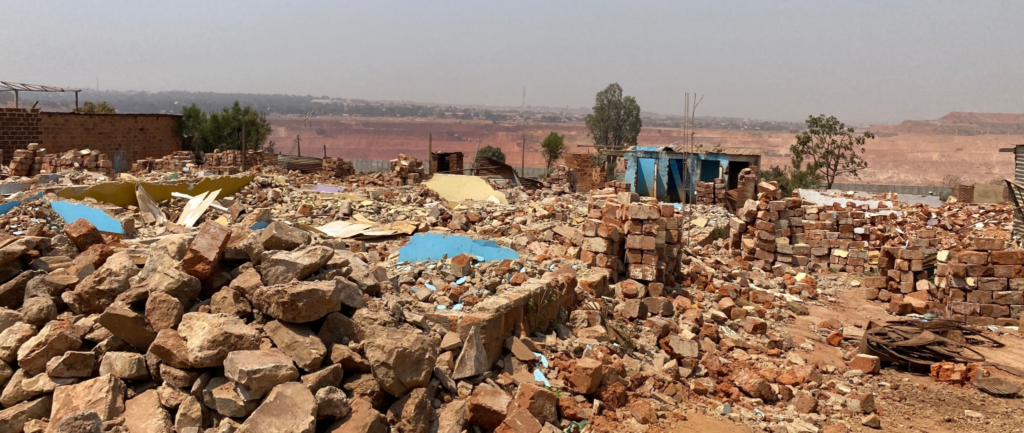
Photo Credits:
This photo was taken by Jean-Mobert Senga and obtained from the Amnesty International website (https://www.amnesty.org/en/latest/news/2023/09/drc-cobalt-and-copper-mining-for-batteries-leading-to-human-rights-abuses/).
We acknowledge and appreciate Amnesty International’s work in documenting human rights issues around the world, and thank them for making these photos available.
Copyright: Jean-Mobert Senga/Amnesty International.”
I also examined the corporations’ role in environmental deterioration. The very survival of nearby populations is in jeopardy because mining operations have ruined forests, poisoned water sources, and disturbed ecosystems. After those mining corporations utilized their property, the residents would protest about the dangers posed by the vast trenches that remain. Those exposed pits were a danger to their young children. Regarding the operations of multinational corporations, there is no accountability. They disregard DRC regulations and international law while doing so with impunity.

Photo Credits:
This photo was taken by Candy Ofime and obtained from the Amnesty International website (https://www.amnesty.org/en/latest/news/2023/09/drc-cobalt-and-copper-mining-for-batteries-leading-to-human-rights-abuses/).
We acknowledge and appreciate Amnesty International’s work in documenting human rights issues around the world, and thank them for making these photos available.
Copyright: Candy Ofime/Amnesty International.”
Why was this topic important to me?
The internal displacement and trauma experienced by the local population have resulted in a humanitarian disaster that requires immediate attention and response. I hoped that by drawing attention to it, I would give the DRC people’s demands for justice another voice.
There are significant worldwide ramifications to this subject. We are all aware that these regions have high demand for minerals like cobalt, tantalite, lithium, and many others. Since the DRC’s natural resources, especially its mineral resources, support global consumption, this problem is a shared duty. Almost everyone uses minerals in different ways, but I can think of a few that immediately spring to mind: laptop batteries, electric car parts, and cellphone parts. It’s an endless list. In the study, the relationship between environmental justice, human rights, and economic exploitation.
My understanding of the human cost of the actions of multinational corporations has increased as a result of my research on this subject. I gained empathy and solidarity by learning more about the difficulties local communities confront. My critical thinking abilities were enhanced by examining the intricate relationships that exist between local communities, governments, and corporations. I became an activist for human rights, environmental sustainability, and ethical corporate practices as a result of this job. I’ll keep researching sustainable mining methods and alternate sources of income in order to help in the field.
I will sum up by saying that this assignment was a life-changing opportunity for me to investigate the complex network of problems related to internal displacement in the DRC. I want to help a growing movement calling for justice, accountability, and sustainability by bringing attention to the harm caused by multinational mining companies.
HRSJ 5040
Human Rights and Social Justice Field Experience
As a student, I learned to investigate research problems related to human rights and social justice by collaborating with relevant organizations and groups. For my practicum placement, I worked with Hope International Development Agency, a nonprofit organization focused on development work related to human rights and social justice. I conducted research on projects developed in agreement with partner organizations or groups. Specifically, I worked on land rights issues in the Philippines and Guatemala and their impact on development. Before my field experience, I participated in training on cultural sensitivity, ethics, and safety.
For the practicum, I worked with Hope International, and they needed to conduct an intermediate evaluation of a project that they were implementing in the Philippines and Guatemala, related to land security and economic development of indigenous persons. However, due to other reasons, the whole project was changed to focus on Guatemala and no longer included the Philippines. The evaluation that Hope International was implementing had the dual purpose of providing a mid-term assessment of project implementation and performance and obtaining empirical evidence for a research project looking into the interactions between land tenure and economic development.
One of the evaluation questions is: To what extent do the type of land ownership and the degree of land tenure security influence the outcomes and impact of development projects and processes?
To answer this question, there was need to develop a typology of land ownership in the project communities in each country and a scale of legal security of land tenure of project families in each of the communities. The work, which was desk-based, included a theoretical framework that would aid in recognizing and comprehending the various forms of indigenous land ownership and protection levels in Guatemala and the Philippines, as well as how these factors affect the results of development initiatives. The organization clearly wanted me to concentrate on a number of issues, including whether some ownership arrangements support more productive uses of Indigenous lands than others or whether certain ownership arrangements are more secure than others (and if so, how and why). I would also focus on the obvious, like if ownership kinds and gender equality and women’s economic empowerment are related in any way.
HRSJ 5710
Food, Art and Community
As part of our Food, Art, and Community class field trip, we went to Butler Urban Farm, a community-driven urban farm that grows food for the community, together with the community, at 127 Clapperton Road on Kamloops’ North Shore. 2015 saw the launch of the farm by the Jubilee Urban Movement and Partners (JUMP) initiative. The Kamloops Food Policy Council (KFPC) assumed management of the organization in 2020 to improve food security amid the COVID-19 pandemic.
The main objective was and still is to produce as much food as possible while offering chances for community involvement. The farm is largely dependent on volunteers to assist with planting, harvesting, and farm maintenance. Harvest. In order to promote openness and lessen stigma, the farm is unfenced and accessible to all members of the community. During certain hours, anyone can come and pick up fresh produce.
Produce is given to neighborhood organizations that assist people who are food insecure as part of this program. To optimize food distribution, the harvesting schedule is supplemented by regular agricultural harvests. A portion of the farm is set aside for people who wish to cultivate and care for their own plots. This program encourages a sense of community involvement and ownership.
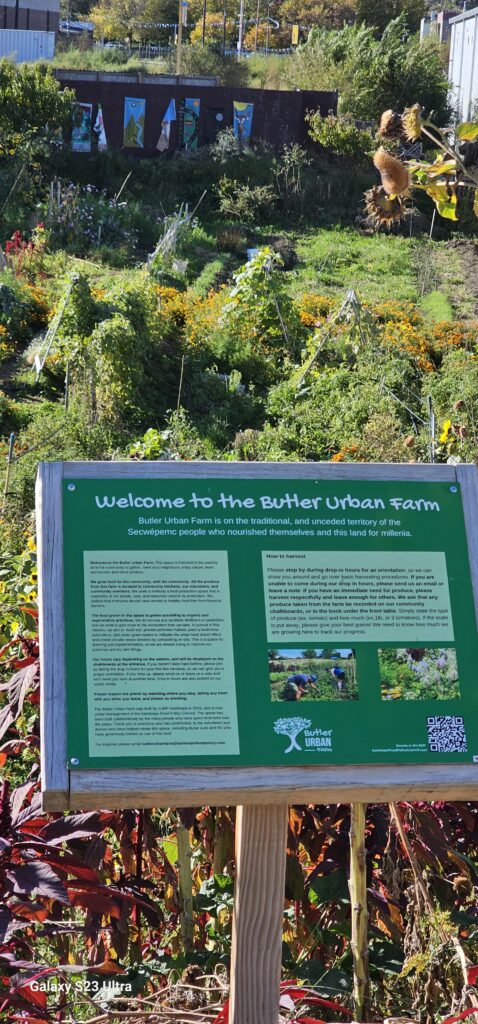
Many local businesses and neighbors have shown wonderful generosity towards the farm. People can help out on the farm with general duties, tend to private plots, or take part in planned harvests. The farm manager plans these events and makes sure that anyone who wants to participate can. The farm’s trust-based business model, which allows locals to collect food during open hours, caught my attention. Butler Urban Farm serves as a brilliant illustration of how community cooperation may improve food security and create a feeling of inclusion.
Dr. Vandana Shiva’s “Who Really Feeds the World?” Chapter 1 was a life-changing experience that had a significant influence on my morals and perspective on the world. My preconceptions about food systems, sustainability, and social justice were profoundly challenged by the chapter’s gripping story and perceptive analysis.
I became aware of the harsh reality of the food system through Dr. Shiva’s criticism of industrial agriculture and its disastrous effects on ecosystems, biodiversity, and local populations. She promotes women’s empowerment, and her focus on the vital role that women play in food sovereignty and sustainable agriculture motivated me to acknowledge and value the sometimes-underappreciated contributions made by women in the food production process. I was inspired to value different worldviews and challenge prevailing Western viewpoints by Dr. Shiva’s support of indigenous knowledge and customs.
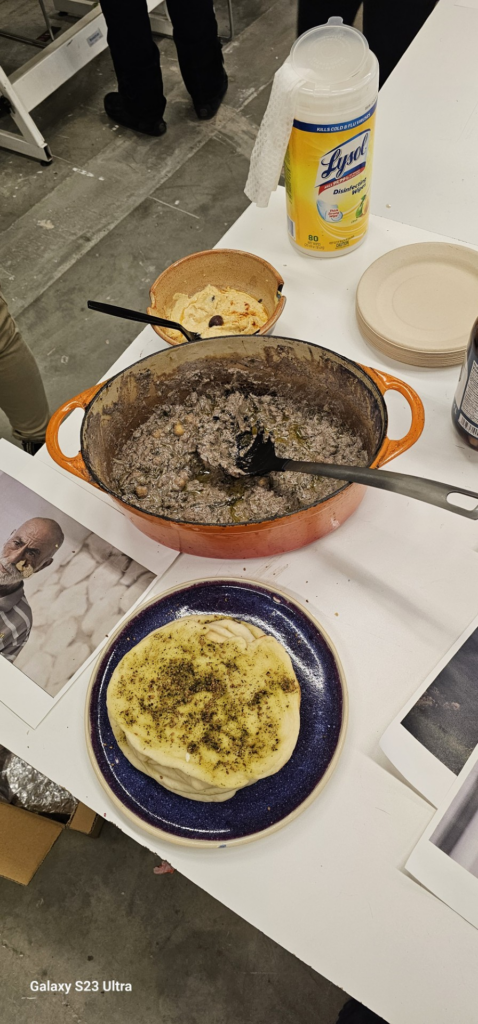
I took this picture on our last day in class. It was a seminar and we did presentations on our final projects and in this particular picture it was a Palestinian dish called Sumac. According to the presentation this is one of the most popular Arab dishes.
I really enjoyed this course and I learnt some food realities that I did not know existed. I also learnt that you can actually have a whole subject to talk about just food. It was only after going through this course that I realized there is so much food injustice, food insecurity and food wastages. I remember one person did a presentation on bananas, she talked on the origins of bananas , types of bananas and she also talked about how people who work in the fields are poorly remunerated and also how this translates to the pricing of bananas. She highlighted that bananas are amongst the cheapest because of the fact that the people who farm them do not get paid fairly. The presentation brought out the injustice in the food industry.
HRSJ5150
Truth to Power: Promoting Social Change on Stage and Screen
Through a variety of conventional and contemporary means of creative expression of social justice concerns on stage and screen, we as students will be analyzing the important script-to-play-to-film adaptations that engage human rights and social justice. The tools we use to evaluate texts will also come from critical and adaptation theories, media studies, theater studies, and creative writing. We are going to write our own movie or stage play that advocates for change on a social justice issue.
As a personal reflection, I must admit that this was a totally different experience for me. In the beginning I had my own perceptions of how the course would go. After having gone through the course I realized what I had in mind and what we did in the course was different. Going into the course I thought we would be doing a thorough analysis of political plays as in taking a deeper analysis on the plays, themes and the minds of the author. In the course we learnt the technicalities behind playwrighting and the types of plays , screenplay and what is expected when you are writing a play or a screenplay and also the differences between the two as well as films.
For someone who had not done playwriting before I found the course a bit demanding. In my own view I think playwright is a different subject altogether and needs to be done on its own because there is so much involved in the short space of time. Just going by the sentiments that I gathered from my fellow students the course is not what the students expected it to be and I am of the same view. I feel we did not do enough in terms of analyzing scripts that engage human rights issues and social justice as we had to do playwriting.
I have to admit that I gained a new skill in playwriting , even though I am still a long way to go in becoming a professional script writer. I feel there is not enough time within the course to become one. The course was very good, I just feel that we could align more on analyzing the works that are already out there that resonate with human rights and social justice and not try to create new works. This is just me thinking.
